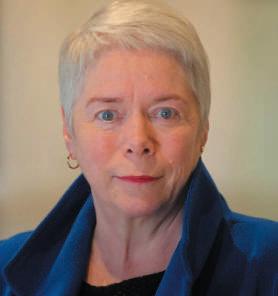
3 minute read
Covid-19 and global solidarity
Covid-19 and global solidarity
The Covid-19 pandemic has illustrated very acutely and painfully the enormous extent to which the people of the world are inter-connected. The virus spread rapidly across borders and continents, affecting every country on the globe.
Early on during the pandemic, President Higgins highlighted the potential for the spread of the virus to hit vulnerable communities in impoverished countries hardest. In April, in an address to a web-conference on the response to the Covid-19 pandemic in Africa, President Higgins said that “while Covid-19 is a global threat, it is the most vulnerable who are most at risk.”
The President pointed out that the Covid-19 pandemic has significantly increased global unemployment and dramatically reduced incomes of all those in precarious employment. In countries with weaker health systems, and in countries facing humanitarian crises, vulnerable people and communities - refugees and migrants, indigenous peoples, older persons, people with disabilities and children – were being left behind, unable to earn a living or access effective health services. “It is not a time for withdrawing behind borders. In the African countries where Covid-19 has arrived, there are immense problems. Problems such as lack of equipment, lack of funding, insufficient training of healthcare workers, and inefficient data transmission.”
‘Responding to Covid-19 in Africa’, April 2020
President Higgins delivering his address to the IIEA, on Europe and Africa
The Covid-19 pandemic is both straining health systems globally, threatening livelihoods, challenging trade patterns, and testing international solidarity.
President Higgins used his international contacts to call for solidarity with the world’s poorest. Highlighting how the Covid-19 crisis is not only challenging our health systems, but also testing our common humanity, the President spoke to a number of Heads of State during the year about the important principle included in the Sustainable Development Goals, to “leave no-one behind.”
In July, the President said: “The choice is clear - to seize a new moment for global solidarity or seek to hide in the thickets of a systemic failure that is failing the vast majority of the world’s people and that has brought our planet to a point of ecological disaster.”
In September, in his contribution to the UN’s ‘High Level Virtual meeting’ on universal access to Covid-19 health care, the President said that the Covid-19 crisis has demonstrated that, when it comes to health, no one will be safe until everyone is safe. The pandemic knows no borders, and can only be tackled through global solidarity and international cooperation. To ensure that people everywhere have access to essential services and social protection, the UN has called for a rapid scale-up of international support and funding to support vulnerable people and countries who are less able to weather the impacts of the pandemic.
Reminding the UN member states that “as is the case with so many crises, including climate change, the Covid-19 pandemic has disproportionately impacted on those most vulnerable, and those most marginalised,” President Higgins argued that there is a moral imperative to working together to ensure that effective and affordable diagnostics, therapeutics and vaccines are made available to all: “Unequal responses to the pandemic will widen inequalities already exacerbated by the impact of Covid-19. We must recognise the damage of inequality.”
In September, speaking at a High Level Virtual UN meeting on universal access to Covid-19 health care, President Higgins called for urgent international action to ensure that poorer countries obtain equitable access to the new health technologies and vaccines, to help stem the spread of the virus.
“As traditional markets have acknowledged that they cannot deliver at the scale needed to cover the entire globe, solidarity within and between countries and the private sector is essential if we are to overcome challenges presented to us by Covid-19 with regard to accessing appropriate medical treatments.”










